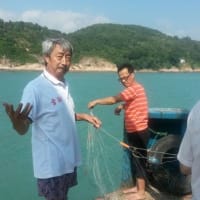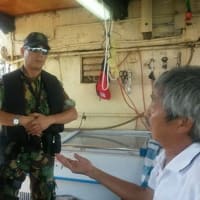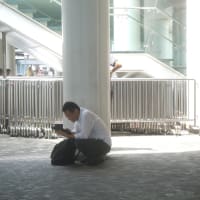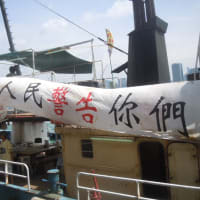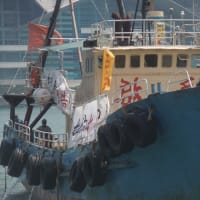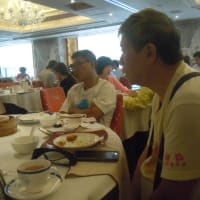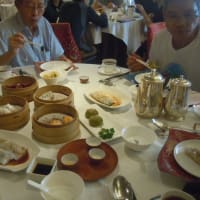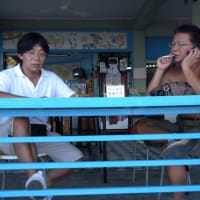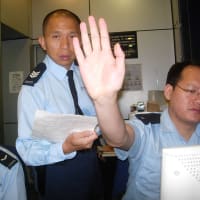こんにちは。フォックス淳子@香港です。ナゼか知り合いが突然
亨ちゃん先生の講演に行くそうなので、質疑を代理持参させます。
口惜しい、キッ。
ところで、仕事中なので手抜きですいませんが、
----- Original Message -----
From: "TADA Kei"
To: <taigu@freeml.com>
Sent: Tuesday, January 21, 2003 10:21 AM
Subject: [taigu:3119] Yomiuri - Kavalan
> ***
これの関連記事(多分)が今日の『Taipei Times』に。
---
Pingpu revisit their native tongue
(Taipei Times 2003.02.07 Taiwan News)
http://www.taipeitimes.com/News/taiwan/archives/2003/02/07/193637
DYING LANGUAGE: An archive of Basai words compiled in 1937 has returned to Taiwan from Japan, triggering a flood of memories for one Hsinshe Aboriginal elder
CNA
Friday, Feb 07, 2003,Page 2
More than 60 years ago, a little boy named Pan Yao-chang (潘耀璋) saw his great grandmother Pan-Shih Yiau (潘氏腰) being escorted in a sedan chair from their hometown in Kungliao by the Japanese bound for Taipei.
Pan did not understand until much later when he was an adult that his great grandmother was invited to the then Taipei Imperial University, now National Taiwan University, by Japanese linguist Erin Asai to help record the Ketagalan language. Pan-Shih Yiau stayed at the university for about a week to help in the effort.
At the same time, another elderly woman of the Pingpu Aboriginal tribe, Lin-Shih I-bai (林氏伊排), from Ilan, was invited by Asai and his research team to the university for the same purpose of recording the dying Ketagalan language, which, according to Paul Lee (李壬癸) from Academia Sinica, should be called the Basai language.
Asai and his team worked with the two elderly Pingpu women for about one month, transcribing their spoken language -- recording about 2,000 words and keeping them in a linguistic archive.
The archive of the 2,000 Basai words -- the only written record of Ketagalan or any other related Pingpu languages used in northern Taiwan almost a century ago -- had been kept in Japan until recently when Lee went there and brought it back to Taiwan.
Lee met with Pan Yao-chang and presented a copy of the Basai language archive, which carries a compilation date of 1937.
Pan, a retired superintendent of a primary school in Keelung, said it was amazing to read the language archive.
Probably the only living Pingpu offspring who still remembers some words of his tribe's language, Pan said to reporters: "Yes, I still remember members of my tribe using the word bahal when they were talking about the basket that they carried on their backs before going hunting."
Pan also said he remembers that when he was a little kid, he would head into the woods with adults to hunt for baokke, or rabbit.
Pan said the retrieved archive has helped bring back all the memories of when he was a child.
Pan's hometown was a village in the coastal Gungliao Township, a place called Hsinshe, or new place, before the Japanese colonial period. The Hsinshe were once one of the largest tribes of the Ketagalan or Basai ethnic group in northern Taiwan.
According to Lee, the Basai people included all the Pingpu people living in the greater Taipei area, as well as part of Ilan, Keelung, Wulai and part of Taoyuan. Although the languages spoken by the northern Pingpu people varied, their languages were bracketed into one big system called Basai, Lee said.
The Aboriginal people who lived in the low-lying areas or coastal flatlands around the island were called the Pingpu by historians.
According to research by Kanori Ino, a Japanese anthropologist who made intensive studies into Tai-wan's Aboriginal people during the Japanese occupation, the ancestors of the Basai Pingpu people in northern Taiwan came from overseas, with the first group landing on the island at Sandiaochiao. The Pingpu population would later spread out around northern Taiwan.
---
Junko FOX
亨ちゃん先生の講演に行くそうなので、質疑を代理持参させます。
口惜しい、キッ。
ところで、仕事中なので手抜きですいませんが、
----- Original Message -----
From: "TADA Kei"
To: <taigu@freeml.com>
Sent: Tuesday, January 21, 2003 10:21 AM
Subject: [taigu:3119] Yomiuri - Kavalan
> ***
これの関連記事(多分)が今日の『Taipei Times』に。
---
Pingpu revisit their native tongue
(Taipei Times 2003.02.07 Taiwan News)
http://www.taipeitimes.com/News/taiwan/archives/2003/02/07/193637
DYING LANGUAGE: An archive of Basai words compiled in 1937 has returned to Taiwan from Japan, triggering a flood of memories for one Hsinshe Aboriginal elder
CNA
Friday, Feb 07, 2003,Page 2
More than 60 years ago, a little boy named Pan Yao-chang (潘耀璋) saw his great grandmother Pan-Shih Yiau (潘氏腰) being escorted in a sedan chair from their hometown in Kungliao by the Japanese bound for Taipei.
Pan did not understand until much later when he was an adult that his great grandmother was invited to the then Taipei Imperial University, now National Taiwan University, by Japanese linguist Erin Asai to help record the Ketagalan language. Pan-Shih Yiau stayed at the university for about a week to help in the effort.
At the same time, another elderly woman of the Pingpu Aboriginal tribe, Lin-Shih I-bai (林氏伊排), from Ilan, was invited by Asai and his research team to the university for the same purpose of recording the dying Ketagalan language, which, according to Paul Lee (李壬癸) from Academia Sinica, should be called the Basai language.
Asai and his team worked with the two elderly Pingpu women for about one month, transcribing their spoken language -- recording about 2,000 words and keeping them in a linguistic archive.
The archive of the 2,000 Basai words -- the only written record of Ketagalan or any other related Pingpu languages used in northern Taiwan almost a century ago -- had been kept in Japan until recently when Lee went there and brought it back to Taiwan.
Lee met with Pan Yao-chang and presented a copy of the Basai language archive, which carries a compilation date of 1937.
Pan, a retired superintendent of a primary school in Keelung, said it was amazing to read the language archive.
Probably the only living Pingpu offspring who still remembers some words of his tribe's language, Pan said to reporters: "Yes, I still remember members of my tribe using the word bahal when they were talking about the basket that they carried on their backs before going hunting."
Pan also said he remembers that when he was a little kid, he would head into the woods with adults to hunt for baokke, or rabbit.
Pan said the retrieved archive has helped bring back all the memories of when he was a child.
Pan's hometown was a village in the coastal Gungliao Township, a place called Hsinshe, or new place, before the Japanese colonial period. The Hsinshe were once one of the largest tribes of the Ketagalan or Basai ethnic group in northern Taiwan.
According to Lee, the Basai people included all the Pingpu people living in the greater Taipei area, as well as part of Ilan, Keelung, Wulai and part of Taoyuan. Although the languages spoken by the northern Pingpu people varied, their languages were bracketed into one big system called Basai, Lee said.
The Aboriginal people who lived in the low-lying areas or coastal flatlands around the island were called the Pingpu by historians.
According to research by Kanori Ino, a Japanese anthropologist who made intensive studies into Tai-wan's Aboriginal people during the Japanese occupation, the ancestors of the Basai Pingpu people in northern Taiwan came from overseas, with the first group landing on the island at Sandiaochiao. The Pingpu population would later spread out around northern Taiwan.
---
Junko FOX











